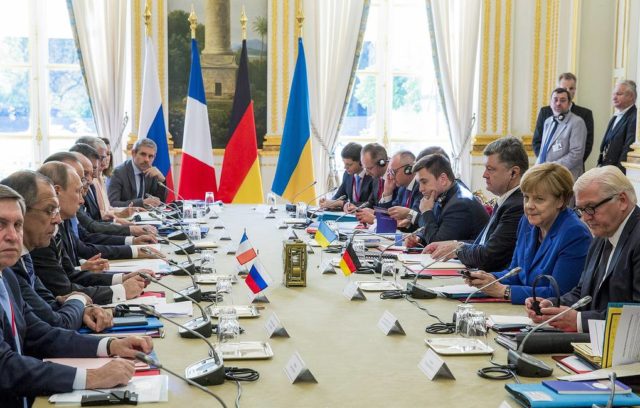
Putin Overplays Hand With Normandy Summit, Inadvertently Rescues Zelenskyy From the Brink (Part One)
Publication: Eurasia Daily Monitor Volume: 16 Issue: 126
By:

The Kremlin has derailed the summit of the “Normandy” group’s leaders (Russia, Germany, France, Ukraine), which was supposed to be held on September 16, in Paris. Apparently, Russian President Vladimir Putin determined at the last moment that his far-reaching objectives for this summit could not be fully achieved at this point (see below). The Normandy group had not held a summit in the last three years. The derailed heads-of-state/government gathering is still expected to be held in Paris, but without a substitute date as yet.
Moscow’s move to thwart or delay this summit has confounded Ukrainian President Volodymyr Zelenskyy, and it embarrassed French President Emmanuel Macron. Both had eagerly sought this summit and built high expectations on it. The recently elected Zelenskyy is hostage to his promises that he would bring “peace” by agreement with Putin in the Normandy framework by the end of this year. Zelenskyy’s team hopes to achieve a quick preliminary agreement with Putin, based on elements of the Minsk “accords” favoring Russia, but short of a conclusive Ukrainian capitulation as the Kremlin seeks in Donbas. For the moment, however, the Kremlin’s preconditions to holding this summit have forced Zelenskyy (or his non-transparent team of advisers) to pull back from the brink at the last moment.
For the host president, Macron, this was to be “his” summit; and the likely rescheduled summit would still be his. Macron is the only one among these four leaders who has established close bilateral relations with each of the other three, coopting Zelenskyy early on (see EDM, April 17). It is Macron’s ambition to project France as convener and mediator in settling this major European crisis, upstaging Germany in the process. To French diplomacy, implementing the Minsk “accords” on Russian-approved terms is a means toward the larger goal of bringing Russia back into Europe arm-in-arm with France, as Macron indicated in his annual speech to French diplomats (Le Monde, August 27). This goal can be attained at Ukraine’s expense by cajoling Zelenskyy into concessions to Putin within the Normandy framework. Meanwhile, coopting Zelenskyy is Macron’s attempt to displace German Chancellor Angela Merkel from the first-fiddle seat on Ukraine that she held during Petro Poroshenko’s presidency. For her part, Merkel displayed none of Zelenskyy’s and Macron’s eagerness to precipitate this summit, and her spokespeople had ambiguously suggested that more time would be needed to prepare it.
Putin’s top advisor, Yurii Ushakov, publicized Russia’s far-reaching objectives for this summit on September 13, three days before the event’s scheduled date. Ushakov named several “prerequisites” to holding the summit, the main condition being the Normandy leaders’ acceptance of the “Steinmeier Formula” for the implementation of the Minsk “agreements.” Ushakov demanded a “written codification of the Steinmeier Formula” at the leaders’ summit, as well as finalization of the summit’s concluding document ahead of the event itself, with implementation guaranteed by an “iron agreement” (Interfax, September 13).
Authored in 2015–2016 by Germany’s then–minister of foreign affairs, Frank-Walter Steinmeier (head of state since 2017), the Steinmeier Formula enjoys official support in Berlin and Paris and the eager embrace of Russia. For its part, Ukraine desperately but also creatively resisted it in the Minsk Contact Group’s negotiations during Poroshenko’s presidency. The Steinmeier Formula‘s collective acceptance (as Ushakov suggested) by the Normandy summit would mean, in practice, imposing it on Zelenskyy’s Ukraine.
The Steinmeier Formula basically prescribes the following sequence of steps to implement the Minsk “agreements”: Ukraine would enact a special status for the Russian-controlled territory of Donbas in Ukraine’s constitution; municipal-level “elections” would be staged in that territory, by agreement with the Donetsk and Luhansk “people’s republics,” and notwithstanding the presence of Russian and proxy forces; Ukraine would bring that special status into effect temporarily on the date of those “elections” and on a permanent basis after those “elections” receive the Organization for Security and Cooperation in Europe’s blessing (i.e., within days). The withdrawal of “foreign” forces and the restoration of Ukrainian control on the Ukrainian-Russian border in that territory are matters to be negotiated after those political steps would have been taken. The two “people’s republics” and their military organizations would remain in place, unaffected by the municipal-level “elections.” The Minsk Contact Group has generated an abundant record of negotiations over the Steinmeier Formula in the last three years.
The Normandy leaders did not hold any summit during this three-year period. Under the ground rules of this process, the top leaders are entitled collectively to hand down instructions to the Minsk Contact Group. The Kremlin apparently expects the Normandy summit, when held, to break Ukraine’s resistance in the Minsk Contact Group. This would require Zelenskyy’s acquiescence at the Normandy summit. Zelenskyy’s eagerness for a quick-fix “end to the war” and a bilateral meeting with Putin at this Normandy summit encouraged the Kremlin to expect foisting the Steinmeier Formula on Ukraine’s new president. Zelenskyy’s wholesale rejection of the Poroshenko legacy, including on matters of war and peace with Russia, further emboldened the Kremlin.
On the other hand, the Steinmeier Formula remains anathema (on a par with “federalization”) in Ukrainian public opinion. The representatives of Zelenskyy’s team must take this fact into account. For all their eagerness to have a meeting with Putin, so as to “end the war”/“make peace” by their self-imposed due date (this year’s end), Ukraine’s leeway for concessions to Russia is limited. Zelenskyy’s negotiators therefore attempted to finesse the summit’s preparations at the level of senior aides in the Normandy format as well in bilateral contacts with Russian counterparts. These awkward attempts surfaced in the tense negotiating endgame, which derailed the Normandy summit planned for September 16 (see Part Two).



